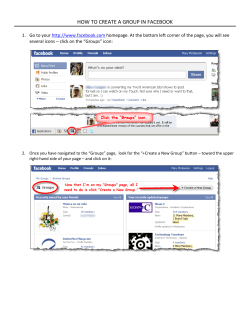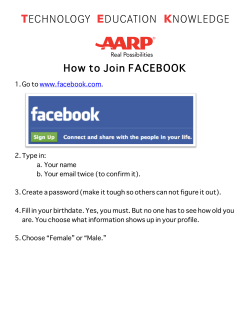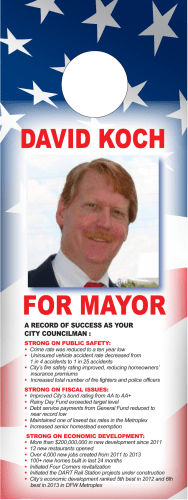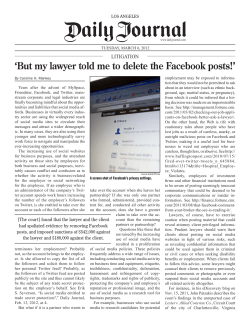
Safe on “Facebook” Against Violence #43 North Queensland Domestic Violence
If you have any complaints about facebook this link could be helpful for you: http://www.privacy.gov.au/faq/individuals/snq4 Copy and paste this link onto you browser. North Queensland Domestic Violence Resource Service. • • • • • • Funded by the Department of Communities Information and referral AARDVARC program for children Community education & training Resources Court Support Men’s Behaviour Change Program (MenTER) Against Violence #43 Safe on “Facebook” NORTH QUEENSLAND DOMESTIC VIOLENCE RESOURCE SERVICE TOWNSVILLE OFFICE PO Box 6061, Townsville QLD 4810 Phone: 07 4721 2888 Fax: 07 4721 1794 [email protected] Mezzanine Floor Metway Arcade, 390 Flinders Street Townsville The most important things to remember when you set up your Facebook are: Set your security/privacy settings carefully. Be aware who you give your passwords to no matter how well you think you know them. Remember to always log out after usage. Be careful if you “make friends” with people you don’t know. MOUNT ISA OFFICE Po Box 502, Mt Isa QLD 4825 Phone: 07 4743 0946 Fax: 07 4743 7999 [email protected] The Old Court House Building, Isa Street http://www.nqdvrs.org.au Funded by the Department of Communities. From protecting your identity to ensuring the safety of you and your loved ones, there are several privacy settings that Facebook uses to help keep personal information private. However if you want to keep things REALLY private, simply don’t upload your information on to the internet, regardless of how safe a website claims to be. Facebook is a great way to stay in contact with family and friends, however it is increasingly being used as a tool in perpetrating abuse and harassment towards others, especially after relationship break ups. Social media has become a common method for employers to obtain information on potential employees. Comments posted on Facebook depending on your settings, may be public domain. With the below safety recommendations embarrassment and abuse may be prevented when using Facebook. Safe on Facebook. ALWAYS log out of Facebook after use. People talk about their accounts being “hacked”. This is usually a result of them not logging out of a PC or a phone. Two Facebooks with the same account logged in can be open on a phone if you have two different versions of the software. Be sure to log out of both. ALWAYS take time to set your privacy settings. It is up to you who has access to your information, photos and videos and who can tag you etc. BE AWARE of your confidentiality, it doesn’t matter how much you trust someone; don’t give out your password for your email address or for Facebook. Logging in using another account, for example Google is not recommended because this is another account to remember to log out of so that your Facebook stays safe. THINK TWICE before making friends with people you don’t know. If you don’t want to add them, just click <Ignore>. YOU MAY want to change your settings from <friends of friends> to <friends only>. Who knows who your friends are – there could be someone that you don’t want to access your Facebook. YOU CAN stop specific individuals from various actions by setting your privacy settings. Securities/privacy settings. To change password and more: Click on the “Account” link at the top right hand side of the page and then scroll down to “account settings” and click You will now come to a screen that shows you where you can change your password, your email address and other information. This is at the top of this screen. Work your way through all of these options. Who should see what: Press “Privacy Settings” These settings are very important when you use facebook. They allow you to make your own choices as to who can see what you post, upload and what friends you have etc. Press “Edit Profile” On screen there will be a variety of options to choose from in the left hand corner. Choose an option from the list eg. “Basic Information”. Beside the information on the right hand side. Click on the little drop down arrow and choose from the options. The options allow you to decide who should see what of your information e.g. “only me”. To block someone: Click the account menu at the top right hand side of any Facebook page and choose Privacy Settings. Find the Block Lists section and click Manage Block Lists. Enter the name or email address of the person you want to block and click Block. People will not be notified when you block them. To deactivate your account: Click the account menu at the top right hand side of any Facebook page and choose Account Settings. Select Security from the left-hand menu. Click on "Deactivate your account" When you deactivate your account, your profile (timeline) and all information associated with it disappears from the Facebook service immediately. People on Facebook will not be able to search for you or view any of your information. If you’d like to come back to Facebook anytime after you’ve deactivated your account, you can reactivate your account by logging in with your email and password. Your profile (timeline) will be restored in its entirety (friends, photos, interests, etc.). Remember that you will need to have access to the login email address for your account in order to reactivate it.
© Copyright 2026





















